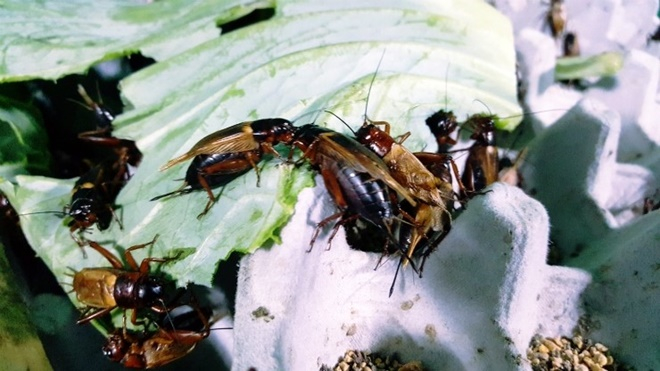Food & Beverage
Lotte invests in Canada's edible insect food company
Lotte is betting on the insect protein market as one of its new growth pillars
By Mar 11, 2022 (Gmt+09:00)
2
Min read
Most Read
LG Chem to sell water filter business to Glenwood PE for $692 million


Kyobo Life poised to buy Japan’s SBI Group-owned savings bank


KT&G eyes overseas M&A after rejecting activist fund's offer


StockX in merger talks with Naver’s online reseller Kream


Mirae Asset to be named Korea Post’s core real estate fund operator



South Korea's Lotte Confectionery Co. has invested around 10 billion won ($8 million) in Canada’s edible insect protein producer Aspire Food Group, taking a major step into the alternative protein market.
Starting with the investment made via a domestic venture capital fund, Lotte will seek cooperation with the Canadian alternative protein startup in areas from technology alliances to product development, Lotte said in a statement on Thursday.
"Lotte Confectionery is highly interested in edible insect products, which are emerging as an alternative protein source," the company said in the statement. It picked the insect protein market as one of its new playing fields.
Aspire Food Group, established in 2016, is a leading cricket protein powder producer. It is set to complete the construction of the world’s largest insect protein manufacturing facility in Ontario, Canada in the first half of this year.
The investment comes after Lotte Group’s research center agreed in late 2021 with France’s Ynsect, an insect protein research startup, to conduct joint research and development. Ynsect has commercialized a mass breeding smart factory of mealworms for the first time in the world.
Edible insects are considered highly nutritious as they are rich in protein. Their fast growth and reproduction rate are prompting food companies to rush into the edible insect market.
"Insects are used primarily as animal feed, but they have limitless growth potential as a future protein source over the next decade," Lotte said.
They are also seen as an eco-friendly food source because an insect farm uses about one-eighth of the water and emits one-third the CO2 of an average cattle farm.
The edible insect market is projected to grow to $710 million by 2024 versus $112 million in 2019, according to Global Market Insights Research and South Korea’s Ministry of Agriculture, Food and Rural Affairs.
In South Korea, crickets, grasshoppers and mealworms have not yet been widely accepted as food, with the relevant market size estimated at only 30 billion won a year.
CJ Cheiljedang Corp. in 2016 launched joint research on edible insects with South Korea's edible insect research institute but has yet to produce relevant products.
Write to Jong-Kwan Park at pjk@hankyung.com
Yeonhee Kim edited this article.
More to Read
-
 Korean foodVegan foodmaker Organica attracts funding from China's CITIC
Korean foodVegan foodmaker Organica attracts funding from China's CITICJan 20, 2022 (Gmt+09:00)
1 Min read -

Comment 0
LOG IN


